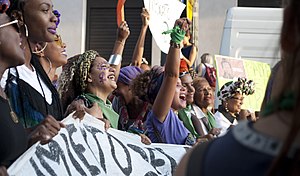International Afro-descendant Women's Day
[4] According to Office of the United Nations High Commissioner for Human Rights and WWP, Afro-descendant people in the region often encounter racial discrimination and marginalization, which can be attributed to historical factors like slavery and colonialism.
In that meeting, 300 women from 32 Latin American countries came together to discuss strategies for political advocacy and to create alliances to combat racism from a gender perspective.
[9][10] The United Nations declared 2015 to 2024 as the "International Decade for People of African Descent" to address the historical injustices and ongoing challenges faced by Afro-descendant communities worldwide.
It aims to recognize the achievements, values, culture, and wisdom of Afro-descendant women in society and highlight their presence and contributions in various fields such as science, sports, law, arts, politics, and activism.
[19][20] Throughout the International Day of Afro-Descendant Women, various activities are organized, including conferences, panel discussions, workshops, artistic performances, and community events.
By engaging in these activities, individuals and organizations contribute to the broader goal of achieving racial and gender equality, dismantling stereotypes, and creating a more inclusive and just society.

